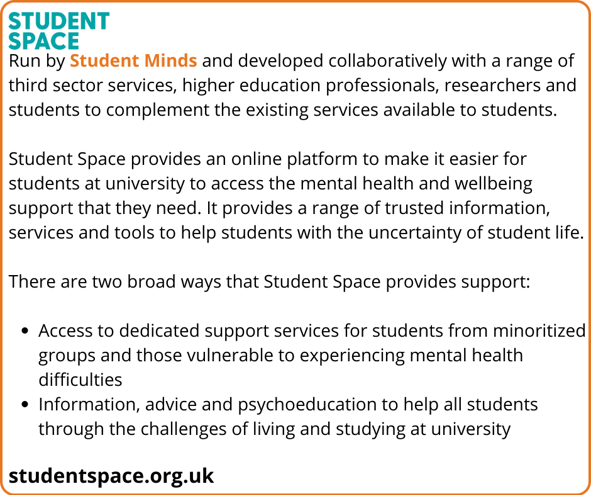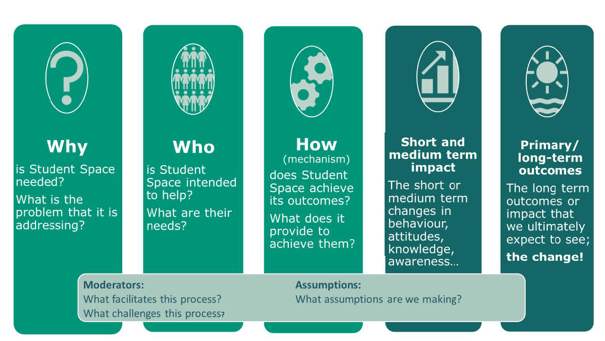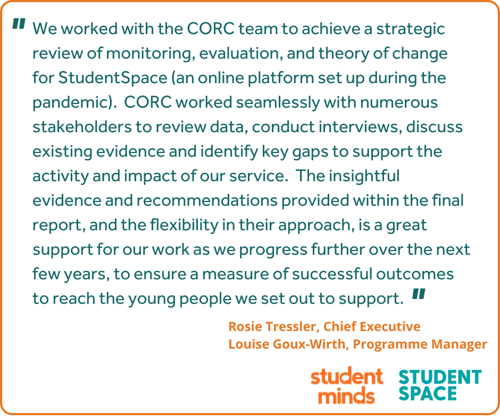Developing a new Theory of Change for an online support platform
We were excited to recently work with Student Minds on their theory of change of Student Space. We applied a version of the theory of change as our approach to develop an updated and realistic model that they can use going forward to evaluate the support they provide to students.
A theory of change provides a description and/or visual representation of how and why an intended change is expected to happen in a particular context. This aims to describe how, and why, key stakeholders expect a service to achieve its intended outcomes, based on the available evidence, or based on assumptions that can be tested through the evaluation.
The CORC approach to theory of change development (fig 1)has been applied and refined through our work in various sectors of children and young people’s mental health support, including perinatal mental health services, school based mental health and wellbeing programmes, specialist mental health providers and various voluntary and community sector services.

A theory of change provides a description and/or visual representation of how and why an intended change is expected to happen in a particular context. This aims to describe how, and why, key stakeholders expect a service to achieve its intended outcomes, based on the available evidence, or based on assumptions that can be tested through the evaluation.
The CORC approach to theory of change development (fig 1)has been applied and refined through our work in various sectors of children and young people’s mental health support, including perinatal mental health services, school based mental health and wellbeing programmes, specialist mental health providers and various voluntary and community sector services.

The challenge of applying a theory of change model to an online platform that provides an array of support and guidance offered the opportunity for us to apply the CORC approach in a slightly new arena. We found that there were few publicly available examples of theory of change models relating to similar types of support, which suggested that this work is not widespread. Our belief however is that this work is invaluable to services and programmes to build in a focus on outcomes and evidence, and to provide a basis for monitoring and evaluation.
We facilitated workshops with students and with Student Minds staff and key partners including university and mental health service representatives. These workshops enabled an open discussion about Student Space. Participants were given the opportunity to reflect and think critically about its target audience, the needs Student Space aims to meet, how it meets those needs and therefore its short to long term expected outcomes. We engaged participants in assessing the extent to which their current understanding of each of these elements is underpinned by an evidence base. For example, can we be confident that providing suitable online self-care guidance and resources will lead to students feeling supported and better able to manage their own mental health and wellbeing?
We also discussed the types of information that would evidence the effectiveness of Student Space including addressing current evidence gaps; what information we need to capture to understand if Student Space is achieving its aims and target outcomes.
We used an online platform to digitally collate live feedback, thoughts and reflections. We then supplemented our analysis of these with a rapid review of outcomes we know are expected in associated programmes in the field. We pulled together these strands of work into a narrative summary of the revised theory of change model, and a graphic for accessible dissemination.
Facilitating this piece of work provided a valuable opportunity to apply theory – the theory of change – to real world practice, in an area of mental health and wellbeing support where this approach is less widespread. It was great to hear the enthusiasm that both staff and students had for Student Space and to be able to facilitate open discussion about its purpose and intended outcomes. This work is always revealing and worthwhile.
If you would like to consider whether creation of a theory of change model could benefit your service or organisation, as a measure for successful outcomes. Or if you have any questions about the approach used in this piece or work, please contact us corc@annafreud.org
